In November, the long-running TV show Supernatural came to an end. The finale left not only queer fans but also fans who are struggling with depression and trauma recovery feeling deeply hurt and unheard by one of their favorite shows. Although our focus here at YA Pride is not on TV, we are all too familiar with the pain of being let down by media. It hurts in a way that few other things do. While most fans have recuperated a bit from the ending of the show, some of the pain still remains. And although Supernatural is the most recent show to hurt fans in this way, it is not the first, and sadly, it will most likely not be the last. In that spirit, we wanted to round-up some wisdom from adult creators on how to deal with this kind of bitter disappointment.
by Nirali Sheth
There’s nothing like having fifteen seasons of build-up to a queer love confession and then getting half of that pairing sent straight to super-hell. Or having the powerful girlfriend of a compelling female main character get killed by a stray bullet. Or having cast members joke about a gay pairing and cuddle together in interviews and wink at the fans only for the creators of the show turn around and call you crazy for ever imagining queerness within a story that you related to.
Because that’s just it. You related to these characters and their stories, which is why you saw queerness in them.
We watch characters rise up against evil, fight for their lives, and create relationships beyond the family they were born with. We see our own stories in worlds that we did not create, which makes us love these worlds.
But we also find others who see the same and we create our own language around it. We find people who will cry with you over a song at a convention. We find people who will write you stories because they love you and you both share this love of a thing. We find people who will tolerate your angry rants about where your favorite character’s storyline is going and scream with you when the plot twist is just that good.
If you’re feeling hurt by the ending of a certain TV show, feel hurt. Because you deserve better and you know you deserve better. We deserve better queer representation on our screens.
But also, hold on to the people who spoke the same language as you. Keep speaking that language and keep making it your own. And maybe, instead of just transforming this thing you loved and disappointed you, you can create something new together. You can create what you deserved to see in the first place.
And also know that this isn’t the first time this has happened. There are others who are now making stories they know we deserve because of the disappointment they’ve felt. And these are stories where the queerness isn’t just subtext, it’s the text. Because the world is the way it is, you might have to dig a little deeper to find these stories, but they’re there, waiting for you to embrace with all the passion and fire you give to everything. They’re waiting to become a part of your language.
—
 Nirali Sheth (she/her) is an incredibly slow writer who also crafts and makes videos and podcasts. Scream with her about music on twitter @firewordsparklr or hang out on her crafting stream at twitch.tv/firewordsparkler, where she talks about writing, movies, and all sorts of other gay nonsense.
Nirali Sheth (she/her) is an incredibly slow writer who also crafts and makes videos and podcasts. Scream with her about music on twitter @firewordsparklr or hang out on her crafting stream at twitch.tv/firewordsparkler, where she talks about writing, movies, and all sorts of other gay nonsense.
by Kay Xavier
Sometimes I feel like being queer is the continual effort to be enough. The continual effort to be patient and wait for our time to come. And much of the time it seems like that effort is in vain. We wait to see ourselves in the media we love and we’ll take the thinnest scraps and cherish them. They didn’t say that this character is queer, but the actions they took in these specific episodes and the line the character said once is hinting, leaning, promising that they are for us. That they are us.
They don’t know what we want, we think. If we just tell them–write social media posts and letters and petitions, talk to our friends, tweet at creators, then they’ll see that we noticed. They’ll see that we saw the queerness and we like it, we want to see more of it. And then when nothing happens, we think that maybe we were too loud or too pushy. Maybe we’re being impatient and it will happen later, when the storyline allows for it. If we’re loud enough they’ll listen, if we’re patient enough, they’ll notice us, if we’re good or attentive or some other kind of enough then we’ll earn that representation and we’ll get it. We’ll see ourselves in our media and some of the hard parts of being queer will be a little easier because we’ll say ‘this character is queer too’. And a lot of times, we’re left waiting for representation. We’re let down.
Right now, I’m supposed to tell you that it gets better and it does. There are people telling our stories and there are people rewriting old ones the way they should have been all along. Queer happiness exists, even if you don’t see it in the places you’re looking. There is so much more than what you see, I promise. There are novels where we get our happily ever afters. There are films where we don’t have to die or move away at the end. More than you know, there are so many of us living our own lives in a way that is happy and fulfilling and ours. We’re here and we’re real and we do get the ending we want.
It’s okay to be disappointed and sad. It’s okay to be angry–I welcome it. See the errors that have been made and say to yourself ‘no more of this’. We can be lanterns for each other, sharing stories real and fictional about ourselves. We can sit down and write or draw or speak our truths and share them so other people know that if you don’t hand us a happy ending, we’ll make our own.
And if you can’t manage that just yet, we’ll make one for you.
—
All my life I’ve loved fantasy. Stories like Supernatural and Buffy have always spoken to me. They captured my imagination, but my love for them was always bittersweet because they were never about me, or at least not people like me. They came close sometimes, depicting outcasts and people from small towns, but a critical piece of my identity, of my self, was missing. So I started asking myself, why not me? Why not us?
When you grow up queer in Guthrie, Oklahoma, you get used to not seeing yourself. Supernatural excited me, especially when they went to Guthrie in an early episode, but even then, people like me were missing from the story.
Epic fantasy was even worse. Even Star Trek, which is supposed to show a more progressive future, left me out (something Discovery is quickly rectifying). I looked at these amazing worlds, places born entirely of someone’s imagination, and too often they couldn’t imagine someone like me fitting in. When queer people did show up, they often died tragically or fought the same prejudices we do in the real world.
The more I read the more frustrated I got. Then I started writing—because the world isn’t just a bunch of straight cis white guys. It’s not abled and neurotypical. When I look at my friends, my found family, that’s not what I see. I started writing the books I do because everyone, every sort of person, should get to see themselves on a page. They should get to see that a happy ending is possible. They should get to be hero.
If you’ve never seen yourself in the fandom you love, in the fantastic stories you love, I want you to know that I see you, that the books I write are for you. More than anything I want you to know that you’re not alone. We’re not alone. And yes, whoever you love, however you identify, or wherever you come from, you can be a hero too.
—
 David R. Slayton grew up in Guthrie, Oklahoma, where finding fantasy novels was pretty challenging and finding fantasy novels with diverse characters was downright impossible. Now he lives in Denver, Colorado and writes the books he always wanted to read. His debut, White Trash Warlock, was published in October 2020 from Blackstone Publishing.
David R. Slayton grew up in Guthrie, Oklahoma, where finding fantasy novels was pretty challenging and finding fantasy novels with diverse characters was downright impossible. Now he lives in Denver, Colorado and writes the books he always wanted to read. His debut, White Trash Warlock, was published in October 2020 from Blackstone Publishing.




